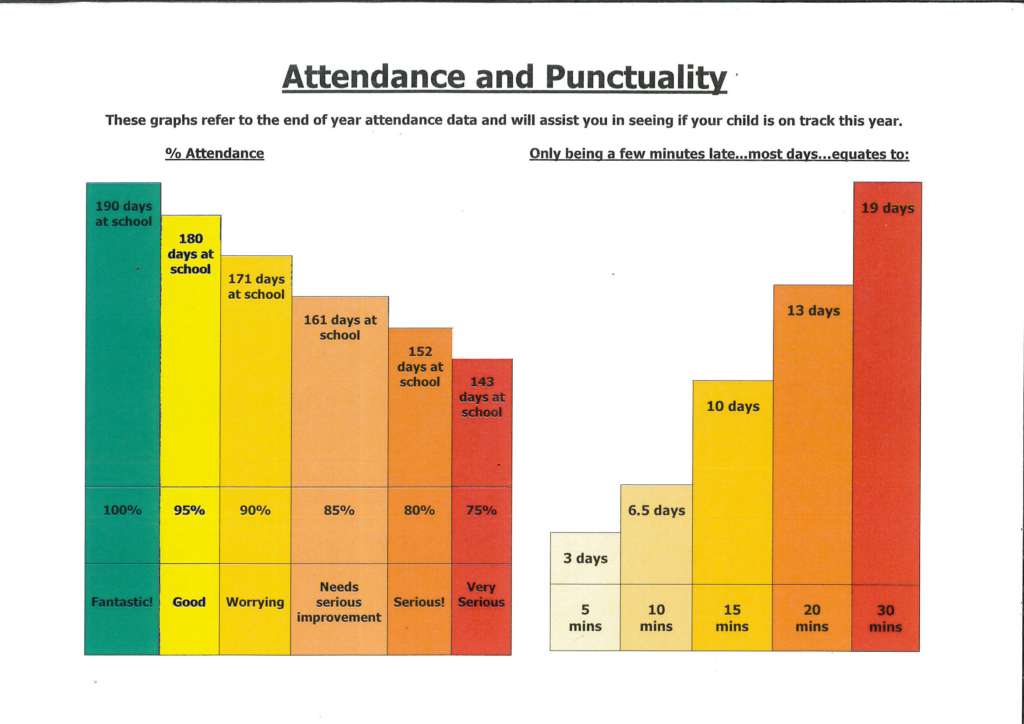Did you know…?
90% attendance sounds good but means that your child misses on average:
- One half day every week.
- Nearly four weeks every school year.
- Over one school year in a school career.
2 weeks holiday in term time every year with no other absences means that your child:
- Can only ever achieve 95% attendance
- Will miss about two terms in a school career
5 minutes late every day means missing about 3 days of school every year
We monitor school absence daily and work with families where the level of absence is giving cause for concern. The information within this section explains the law and how legal sanctions for irregular attendance at school are applied in our school.
Does my child have to go to school?
The law makes parents and carers responsible for ensuring that their children of compulsory school age (5 to 16) receive a suitable, full-time education. This can be either by regular attendance at school or otherwise.
What should I do if my child is absent from school?
- If your child is going to be absent, contact the school on the first morning and keep the school up to date if it turns out to be a longer absence.
- Send a signed and dated note with the reason for the absence when your child returns to school.
- It is a school that decides whether or not to authorise an absence.
- If there is a problem speak to the school – support will be available but staff need to be told about any difficulties as soon as possible.
What can happen if my child is absent from school on a regular basis?
Absence means:
- Missing out on school work and it can be very hard to catch up.
- Losing touch with friends and teaching staff.
- Finding it more difficult to have a successful future after leaving school.
- Having more opportunities to become involved in crime and anti-social behaviour either as victim or perpetrator.
- If your children are registered at school, the law makes you responsible for making sure that they attend regularly.
Schools:
- Monitor attendance and will try to support pupils who may be having difficulties
- Have to inform the Local Authority of every pupil who doesn’t attend regularly.
- Can refer concerns about attendance to the Attendance Service at the Local Authority.
What about absence due to illness?
If your child is ill, it’s important to take time to get better, but infection doesn’t always mean that your child has to be off school for ages! For guidance on how long your child should be off with an illness, click here.
What about family holidays in term time?
Pupils don’t have the right to have time off for family holidays in term time. Schools can give permission for all, part or none of the time requested but can only give permission in exceptional circumstances.
You must apply in advance for permission to have a family holiday in term time.
If school doesn’t give permission and you go anyway, the absences will be marked as unauthorised and you may be issued with a penalty notice for each child when you return.
What legal sanctions can the school use?
The school may take legal action against you if your children do not attend regularly and the absences aren’t authorised by the school.
Penalty notice issued:
- Your local council can give each parent a fine of £80, rising to £160 if you do not pay within 21 days.
- From the 2024 to 2025 school year, each parent will only get up to 2 fines for the same child in a 3-year period.
- If you get a second fine in 3 years it will be £160. If you do not pay the fine in 28 days you may be taken to court for keeping your child out of school.
- If your child is off school 3 or more times within the 3 years you will not be fined but may be taken to court.
- Check your local council’s rules on when you can be fined and how to pay a fine.
If you’re taken to court
You could get a fine of up to £2,500, a community order or a jail sentence up to 3 months. The court could also give you a Parenting Order.
How can I help my child to get the best out of school?
- Be aware of the impact of regular absences – missing school is missing out.
- Build up good habits of punctuality and attendance. These start early in life, so even before your child starts school, establish good routines, such as reading before bedtime and going to bed on time.
- Make sure your child understands the benefits of regular attendance at school.
- If your child is off school, you must let the school know why and tell them when they can expect your child back.
- It can be difficult, but try to make all appointments for the doctor, dentist, optician after school hours or during the school holidays where possible.
- Don’t let your child stay off for reasons like going shopping, birthdays, minding the house, looking after brothers and sisters.
- Avoid taking family holidays in term time.
- Take an active interest in your child’s school work and offer support with homework.
- Attend parents’ evenings to discuss your child’s progress.
- Don’t let your child stay off school for a minor ailment.
- Each school day is split into two sessions and the attendance register is taken every morning and afternoon. If your child is poorly first thing or but improves by lunchtime, send them into school for the afternoon session.
- If your child recovers from illness before the end of the week, send them back to school even if it’s only for one day – every day counts.
What if I am worried about my child’s school attendance?
- Talking to the school is the best place to start.
- Don’t be afraid to get to know your child’s teachers and head teacher – sharing problems is the first step to solving them.
These graphs refer to the end of year attendance data and will assist you in seeing if your child is on track this year .
Attendance & Punctuality (download)



